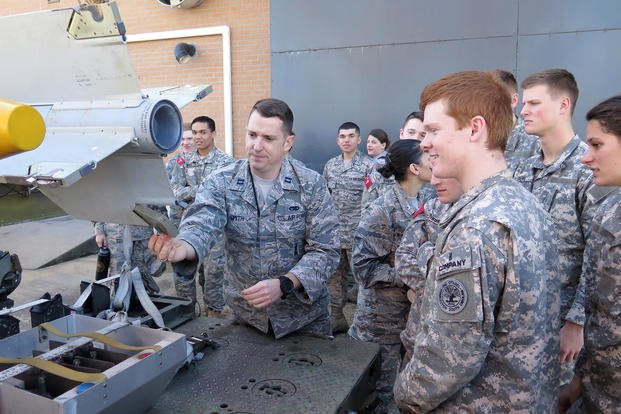Approximately 2,400 Air Force ROTC cadets are forgoing lazy summers at home for a series of 28-day field training courses at Maxwell Air Force Base in Alabama.
Field training is designed to evaluate cadets' leadership potential and discipline and their readiness to enter into the Professional Officer Course in their junior year, a requirement before receiving a commission from ROTC.
The first few minutes of field training are similar to the experience enlisted recruits encounter when arriving for basic military training at Lackland AFB, Texas.
"Getting off the bus was terrifying," said Cadet Kody Derozier, a student at South Dakota State University. "The MTIs [military training instructors] get on the bus and set the tone for our time here immediately. It is a definite culture shock, and you either adjust or you won't be here very long, and there goes your military career right there."
The cadets are split into flights where they will attack the training program while teamed with others from all over the U.S.
"This is the pivotal point in cadets' training as far as being in the ROTC program," said Capt. Henry Sims Jr., operations flight commander at University of North Carolina-Chapel Hill detachment. "This serves as their basic military training and gateway into the professional officer's course. They become more of the leaders in the detachment rather than a follower as an underclassman."
Sims is one of several ROTC detachment cadre who come to field training as instructors.
The military services' ROTC cadets participate in basic military education and officer training, varying on their specific branch of service, while receiving higher education just like the other students on campus.
"Back at school, as freshman and sophomores, they learn what the Air Force is all about by watching the upperclassmen who have already been to field training," Sims said. "They earn the opportunity to sharpen their skills and come here to learn how to lead.
During their training days here, cadets are on the move from reveille at 4 a.m. until lights out at 9 p.m.
"It's definitely a shock in the morning when you get woken up with all of the yelling, whistles blowing and forced quick movements out of bed and ready to go," Derozier said. "It gets fairly hot in South Dakota, but here, the humidity is unforgiving all day long. Water is a priority constantly as we try and make it through the busy day."
Cadets are tested in physical fitness, drill, the field training manual and airman's manual. Those who pass the tests earn the opportunity to advance to the next two years of training in their detachments.
Part of the curriculum at field training is a 14-day mock deployment, where cadets are taught expeditionary skills. For the exercise, they are assigned supporting roles within their groups, which gives them the opportunity to put the leadership training they've learned in the classroom to practical use in the field.
"Out at the deployment location, they receive more understanding of the warrior ethos," Sims said. "When they get out there, they take what they have learned up to that point and start to execute special tactics and have the opportunity to better understand leadership positions down range. In real-world scenarios, these cadets will be better prepared for situations through the baseline situations they go through in the simulated combat environment."
Returning from the "deployment," cadets complete their training days and prepare to take their experiences here back to their detachments.
"You fine-tune all of your problem solving and leadership qualities while you are here," Derozier said. "When I go back, I am supposed to be a flight commander, and it will be my responsibility to be a leader in the detachment. What I learn here will be instrumental in my preparedness for what will be expected of me not only when I return to college, but throughout my military career."
Ready to Join the Military?
We can put you in touch with recruiters from the different military branches. Learn about the benefits of serving your country, paying for school, military career paths, and more: sign up now and hear from a recruiter near you.















